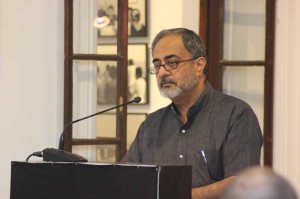DAY 1
When I arrived at the Harrington Art Centre on the morning of 30th July 2015, I was convinced that my phone had conspired to make me arrive late—it was stubbornly declaring the time to be 8.30 when I could clearly see that seats had already been occupied for the conference that was supposed to begin at 9.15 am. My phone, it turned out, was quite right—enthusiastic participants had arrived well before time and the first colourful pieces of the participant introduction collage were already up on the board.
The International Conference on Teaching History was an attempt by concerned individuals to change the way history is perceived and the way teaching of history is carried out in the classrooms of the subcontinent. As Naveen Kishore said in his welcome address, our shared history was once a beautifully woven cloth that has now been reduced to tatters. It’s time that we make an effort to heal it; it is important to remember the words we didn’t write.
Keynote
In the first keynote of the conference, Dr Barbara Christophe of the Georg Eckert Institute, took the podium to explore how we can arrive at narratives of violence in our textbooks without inducing violence in the readers, beginning a strand of thought that was consequently woven in throughout, over the three days. Dr Christophe spoke about the nature of memory and history while also commenting on the strategies of writing history.
The act of remembering, she said, is an ambivalent oscillation between the past and present. Memory is a construction of the past invoked by the social and cultural influences of the present and expressed within a language which adheres to predetermined worldviews. The memory we perceive to be a coherent story is established by the socio-cultural norms of present location and not by the incoherence that is life. The same individual is subject to have conflicting memories about the same subject, exemplified by the Kurdish citizen who as a state agent abhorred the Russians and as a teacher of history found them to be a caring administration who increased his compensation. As for collective memory, she noted that it is not only what is remembered but who it is that remembers. The politics of memory thus is controversial and is often tuned towards self-reflection as well as social cohesion. This emphasises discrimination and the us and them divide. Therefore the collective memory when included in our histories needs to be inclusive. She stressed that in order to know what we are, we need to know what we are not. Ending her discussion on memory, Dr Christophe left us with a discomforting question – what happens when memory fails?
Defining history as an institutionalised form of memory, Dr Christophe emphasised that there can be no valid claim for sameness in history and that what is mentioned in the pages of history is as important as that which has been omitted. Values incorporated into history dictate how the narrative is realised in linguistic terms–the familiarity evoked by the phrase ‘President Kennedy’ juxtaposed against the unfamiliarity looming in the phrase ‘the General Secretary of the Communist Party’ clearly points to the difference created by certain linguistic emphasis. Dr Christophe then proceeded to dismantle the arguments put forward by scholars who differentiate history from memory—empirical cogency that is found in history is supposed to be derived from the source based nature of the facts put in history. But where, she asks, do these sources come from? The normative cogency demanded by history is to be transparent. But where does that leave the values incorporated in history? History is also said to be a coherent narrative, but how can coherence be recorded on the face of the incoherence which is life? As to the purpose of history as merely a record of the past, she asks how we can possibly write narratives without incorporating values.
Textbooks, she noted, are reflective of the current hegemonic discourses and change with the changing political scenario. Textbooks then, are akin to palimpsests, recording and re-recording history as the ruling power sees fit. A contentious point in history textbooks is the question of presenting the traumatic past. Should we, like Bosnia and Rwanda, opt for social amnesia? Or wait till ‘enough’ time has elapsed before revisiting the past, as seen in Germany where it took two decades for the holocaust to find place in history books, and let social media and popular culture fill the void left by education? Issues of timing are tantamount to reporting history. Is immediate reporting better to prevent distortion? Or is it better to let the next generation tackle the issues of the past, allowing time for readjustment of perspective.
Perspective is a very important element of textbooks—it could be an entangled approach wherein both sides attempt to come to a compromise, an objective perspective or a viewer narrative which allows for multiple perspectives and even incorporates a biographical approach, thus an individual’s story. The last option allows space to incite thought in the students and let them think of difference in a positive light.
In concluding her keynote, Dr Christophe reiterated that ambivalence percolates through all the three realms of history, memory and textbooks and that even though all the approaches to the latter that had been discussed contained advantages and disadvantages, they deserve to be looked at and explored further to build the textbook into an agent for change.


